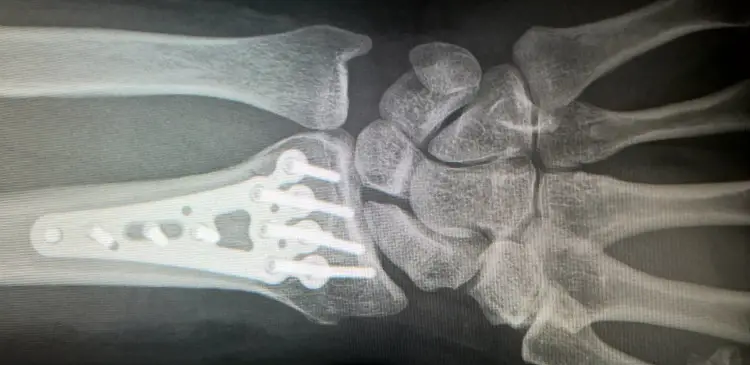Click To Call Us 24/7
Did your loved one break a bone in a nursing home? Did your loved one suffer a fractured wrist, hip, foot, or ankle? Bone fractures may be a sign of nursing home neglect or abuse.
Meet Our Nursing Home Negligence Lawyers.



Broken Hip in Nursing Home? Our Lawyers Can Help
In elderly patients, broken bones are a significant and serious injury. A broken toe or foot, as well as broken hips or legs, increase the risk for a serious fall in the future.
These injuries should never be taken lightly, no matter the age of the victim. However, when they occur within the walls of the nursing homes we’ve entrusted with the care of our loved ones, there are serious questions that must be answered.
If you’re unsure if you have a valid case, get in touch with us today and learn more in a free case review. Simply call or fill out the form on this page.
"Experienced." Thankfully, our grandmother is safe now.

In the best of cases, a bone fracture can reduce a nursing home resident’s mobility and lead to declines in their enjoyment of life, making it difficult to move and be sociable. These deleterious effects can last long after the broken bone has fully healed.
Bone fractures are common among members of the elderly population, especially those who suffer from osteoporosis or other bone conditions, and those who have lost muscle and fat density, both of which usually cushion the bones from trauma.
Types Of Bone Fractures That Occur In Nursing Homes
The most common forms of bone fractures seen in elderly nursing home residents include:
- Hip fractures
- Pelvic fractures
- Arm fractures
- Thighbone (Femur) fractures
- Hand fractures
- Back or vertebrae fractures
- Ankle fractures
- Leg fractures
It’s especially important to demand answers when a loved one suffers an uncommon broken bone, such as a foot fracture. These fractures are not seen often in nursing home residents, so it’s essential to find a clear explanation of how the fracture manifested.
Contact Our Law Office Today
Click To Call Us 24/7
In some cases, these fractures are the result of a simple accident – perhaps the nursing home resident attempted to stand without assistance and fell down, breaking their hip. In other cases, bone fractures are a direct result of the negligence of a nursing home and its staff members, in which case, families have the option of filing a private civil lawsuit.
Nursing Home Falls & Fractures
Broken bones are common after falls in a nursing home, which are a common sign of nursing home neglect. In fact, the vast majority of fractures among the elderly, up to 90%, are caused by falls. Some nursing homes fail to properly supervise their residents, allowing patients who should not move without assistance to get out of bed on their own. Other facilities are cluttered by debris and hazards, leaving residents at risk of a fall. These are examples of negligence, a careless disregard for the safety and wellbeing of residents.
Other examples of nursing home negligence include:
- lifting a resident into or out of bed in an inappropriate manner
- failing to give the resident an assistive device, like a wheelchair or walker
- failing to diagnose or properly manage a bone disorder
Getting Answers After A Fall
If your loved one suffered a broken bone, you need to find out how it happened. Speak to a nursing home manager to find out if any nurses or aides were present at the time of the accident. If the resident was alone, demand an answer as to why your loved one was left alone. Nursing home staff members should be present when patients who are at risk of falling are standing or performing activities that require bodily movement.
Also, it’s important to obtain a detailed medical report from the nursing home, along with the facility or hospital in which your loved one received medical treatment. If any of the details of the incident appear suspicious to you, you would do well to contact an experienced attorney.
If your loved one is able to communicate coherently, ask them what happened to cause the fracture. If their story does not match the nursing home’s story, you have cause for concern.
Fractures As A Sign Of Elder Abuse
Fractures can also be a sign of physical elder abuse, the intentional use of violence or force to harm a nursing home resident. Broken bones can be a sign of abuse, especially when the injuries repeat, cropping up on a regular basis in a similar manner.
As a result of these considerations, falls can be a sign of nursing home neglect – when a nursing home fails to uphold its sworn obligation to care for residents adequately.
Filing A Civil Lawsuit After A Bone Fracture In An Assisted-Living Facility
Nursing home neglect is a viable cause of action in a civil lawsuit, as is nursing home abuse. If your loved one fell and broke a bone in a Pennsylvania nursing home, your family may be eligible to file a lawsuit against the facility. Lawsuits are also possible in the case of physical elder abuse, especially when the abuse is carried out by a nursing home staff member or another resident in the home. You can file a lawsuit for compensation.
Nursing homes should be held accountable for their errors and mistakes. If your loved one suffered harm, your family can fight back. Learn more about your legal options in a free consultation today. Our dedicated attorneys are here to help. We’ve already helped countless nursing home residents pursue justice by filing lawsuits. Your family can be next.
Why You Should Take Action Now
Take action now. Pennsylvania law may severely limit the amount of time your loved one has to file suit. It’s critical to comply with the statute of limitations, a law that restricts the amount of time in which nursing home neglect and abuse lawsuits can be filed. Under Pennsylvania law, the statute of limitations for nursing home abuse and neglect lawsuits is two years, beginning on the date of the injury or accident. You must comply with this deadline. Attempt to file your suit after the deadline has passed and your case will be dismissed.
Protect your family’s rights today. Learn more about your legal options in a free consultation. Our experienced nursing home abuse and neglect attorneys are here to help. You can find more information in a confidential consultation at no charge and no obligation.
